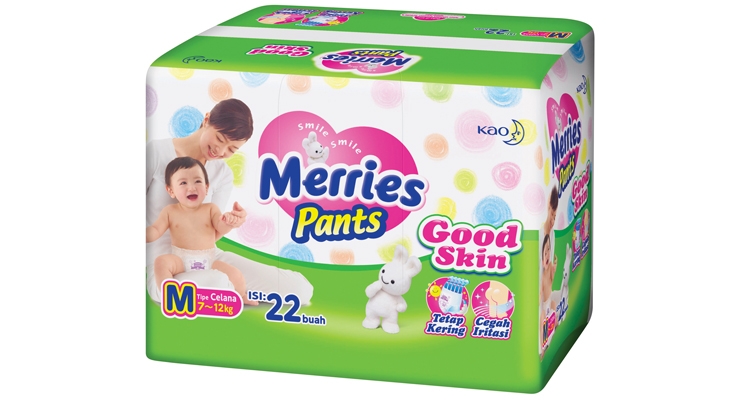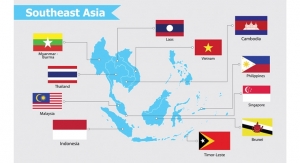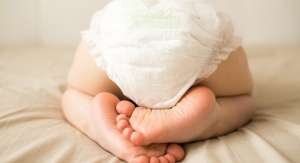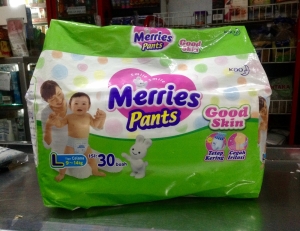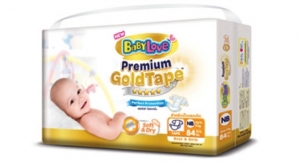Karen McIntyre, Editor03.04.19
In August 2018, Japan’s Kao Corporation started selling its Merries brand of disposable diapers in India, hoping to replicate the success it had with the products in China and expand its global presence.
Kao’s Merries brand generates more than ¥10 billion in sales annually and is the leading premium diaper brand in Japan, and the company is betting that Indian consumers will have the same taste for premium diapers as its Chinese counterparts. Kao was one of the first companies to launch a premium diaper in China after it noticed Chinese tourists traveling to Japan buying them in bulk—a move that was followed by many of its competitors.
In recent years, Kao has increased its total online transcation volume 20-30% in recent years, thanks largely to the success of Merries. Meanwhile, in ndoensia the company continues to gain ground on local rivals.
A single Merries diaper costs two to three times that of a Unicharm diaper manufactured locally, as Kao exports such products from Japan to India. Kao has capitalized on Merries’ reputation for being gentle to the skin, which is highly valued in many countries.
When he announced in December 2016 Kao’s medium-term business plan through 2020, CEO Michitaka Sawada said he wanted the company to become a top-three player, alongside Procter & Gamble of the U.S. and Anglo-Dutch Unilever, by 2030. Its success in China was a major step toward that goal.. While some of its rivals rely on discounts as high as 50% to pump up sales, Merries sell well even with small discounts because “Chinese consumers perceive Merries as a premium product,” said one industry insider.
It’s not surprise that India would be on the company’s sights. The diaper industry there is currently pegged at about 4.6 billion pieces or $800 million. The industry is expected to grow to about 10 billion pieces or $1400 million by 2022. Increasing birth rates, higher disposable incomes, increased hygiene awareness and a radical increase in the number of working women are factors driving this market growth.
Nonwovens Industry SEA spoke to Kao executives about their plans for the Indian subcontinent and why it feels that emerging markets prefer premium diapers.
NWI: Why has Kao decided to enter into the Indian market with its diapers?
Kao: With our vision to “make Kao a company with a global presence,” Kao Group is actively working to expand its overseas business. We regard the Indian market as extremely valuable, and we have been conducting studies to strengthen our understanding of this market. With Mitsui & Co. as our partner in the market, we can now sell our baby diapers on Amazon India, finally making our long-awaited entry into the market.
NWI: Do you think that India consumers will demand premium diapers in the same way that Chinese consumers have?
Kao: We believe that all parents, regardless of their nationality, want to use diapers that are gentle on their beloved baby’s skin. Therefore, we expect that the strengths of Kao’s baby diapers, as described below, will also appeal to customers in the Indian market. As with the launch of the diapers in other countries, we will further strengthen our marketing activities in India so that the customers can realize these “strengths” by trying out the product.
Kao’s baby diaper brand, “Merries,” is preferred by many customers worldwide. Our diapers are highly reliable, in terms of the basic functions of diapers, such as high absorbency and leakage prevention. They are extremely gentle on baby’s skin and that is another strength.
Since its launch in Japan in 1983, “Merries” has continuously been improved as a result of our endless pursuit of “gentleness to the baby’s skin.”
Also, in surveys conducted overseas, “Merries” has received exceptionally higher ratings, compared to its competitors, for “gentleness to the baby’s skin,” which includes long-lasting dryness, softness of the fabric, and prevention of diaper rashes.
NWI: Do you plan to produce the diapers in India or import them from Japan?
Kao: At present, our baby diapers sold in India are manufactured in and imported from Japan.
NWI: Why have you decided to partner with Mitsui Chemicals to enter India? Can you discuss this partnership?
Kao: We have established that Mitsui’s knowledge of the Indian market, as well as their investment business and networks in India, might prove very useful for our business expansion in the Indian market, and we have thus reached a partnership agreement.
NWI: How great do you consider the potential of the Indian diaper market?
Kao: As 25 million babies are born in India every year, we view this market with huge potential for baby diapers.
NWI: Has Kao focused on any other countries in Asia like Vietnam, Thailand, Indonesia, etc.? Can you talk about the needs of these countries?
Kao: Kao is currently selling its baby diapers in about 30 countries and regions, including non-Asian countries such as Russia. When we launch a new product, we conduct rigorous home visit surveys to address the true needs of local customers. For example, our surveys show that the need for baby diapers differs from country to country: pants diapers are predominantly used in Indonesia while, in China, tape diapers had been the mainstream diapers although the popularity of pants diapers is on the rise in recent years. However, as mentioned in the answer to Q2, we regard the need for “gentleness on the baby’s skin” is common to all countries.
NWI: Does Kao have any plans for acquisition or investment in Asia (outside of Japan). What are some parts of your strategy to continue to grow in Asia?
Kao: Unfortunately, we can’t tell you specific plans for the future, but Kao is actively investing in various aspects of its business, such as R&D, marketing and capital assets, both in Japan and overseas. We make use of the results and outcomes of these investments to develop products and services for global markets, including those in Asia.
Regarding our growth strategy in Asia, we plan to develop new markets and businesses, as was the case with the launch of our baby diapers in India in late June this year.
Kao’s Merries brand generates more than ¥10 billion in sales annually and is the leading premium diaper brand in Japan, and the company is betting that Indian consumers will have the same taste for premium diapers as its Chinese counterparts. Kao was one of the first companies to launch a premium diaper in China after it noticed Chinese tourists traveling to Japan buying them in bulk—a move that was followed by many of its competitors.
In recent years, Kao has increased its total online transcation volume 20-30% in recent years, thanks largely to the success of Merries. Meanwhile, in ndoensia the company continues to gain ground on local rivals.
A single Merries diaper costs two to three times that of a Unicharm diaper manufactured locally, as Kao exports such products from Japan to India. Kao has capitalized on Merries’ reputation for being gentle to the skin, which is highly valued in many countries.
When he announced in December 2016 Kao’s medium-term business plan through 2020, CEO Michitaka Sawada said he wanted the company to become a top-three player, alongside Procter & Gamble of the U.S. and Anglo-Dutch Unilever, by 2030. Its success in China was a major step toward that goal.. While some of its rivals rely on discounts as high as 50% to pump up sales, Merries sell well even with small discounts because “Chinese consumers perceive Merries as a premium product,” said one industry insider.
It’s not surprise that India would be on the company’s sights. The diaper industry there is currently pegged at about 4.6 billion pieces or $800 million. The industry is expected to grow to about 10 billion pieces or $1400 million by 2022. Increasing birth rates, higher disposable incomes, increased hygiene awareness and a radical increase in the number of working women are factors driving this market growth.
Nonwovens Industry SEA spoke to Kao executives about their plans for the Indian subcontinent and why it feels that emerging markets prefer premium diapers.
NWI: Why has Kao decided to enter into the Indian market with its diapers?
Kao: With our vision to “make Kao a company with a global presence,” Kao Group is actively working to expand its overseas business. We regard the Indian market as extremely valuable, and we have been conducting studies to strengthen our understanding of this market. With Mitsui & Co. as our partner in the market, we can now sell our baby diapers on Amazon India, finally making our long-awaited entry into the market.
NWI: Do you think that India consumers will demand premium diapers in the same way that Chinese consumers have?
Kao: We believe that all parents, regardless of their nationality, want to use diapers that are gentle on their beloved baby’s skin. Therefore, we expect that the strengths of Kao’s baby diapers, as described below, will also appeal to customers in the Indian market. As with the launch of the diapers in other countries, we will further strengthen our marketing activities in India so that the customers can realize these “strengths” by trying out the product.
Kao’s baby diaper brand, “Merries,” is preferred by many customers worldwide. Our diapers are highly reliable, in terms of the basic functions of diapers, such as high absorbency and leakage prevention. They are extremely gentle on baby’s skin and that is another strength.
Since its launch in Japan in 1983, “Merries” has continuously been improved as a result of our endless pursuit of “gentleness to the baby’s skin.”
Also, in surveys conducted overseas, “Merries” has received exceptionally higher ratings, compared to its competitors, for “gentleness to the baby’s skin,” which includes long-lasting dryness, softness of the fabric, and prevention of diaper rashes.
NWI: Do you plan to produce the diapers in India or import them from Japan?
Kao: At present, our baby diapers sold in India are manufactured in and imported from Japan.
NWI: Why have you decided to partner with Mitsui Chemicals to enter India? Can you discuss this partnership?
Kao: We have established that Mitsui’s knowledge of the Indian market, as well as their investment business and networks in India, might prove very useful for our business expansion in the Indian market, and we have thus reached a partnership agreement.
NWI: How great do you consider the potential of the Indian diaper market?
Kao: As 25 million babies are born in India every year, we view this market with huge potential for baby diapers.
NWI: Has Kao focused on any other countries in Asia like Vietnam, Thailand, Indonesia, etc.? Can you talk about the needs of these countries?
Kao: Kao is currently selling its baby diapers in about 30 countries and regions, including non-Asian countries such as Russia. When we launch a new product, we conduct rigorous home visit surveys to address the true needs of local customers. For example, our surveys show that the need for baby diapers differs from country to country: pants diapers are predominantly used in Indonesia while, in China, tape diapers had been the mainstream diapers although the popularity of pants diapers is on the rise in recent years. However, as mentioned in the answer to Q2, we regard the need for “gentleness on the baby’s skin” is common to all countries.
NWI: Does Kao have any plans for acquisition or investment in Asia (outside of Japan). What are some parts of your strategy to continue to grow in Asia?
Kao: Unfortunately, we can’t tell you specific plans for the future, but Kao is actively investing in various aspects of its business, such as R&D, marketing and capital assets, both in Japan and overseas. We make use of the results and outcomes of these investments to develop products and services for global markets, including those in Asia.
Regarding our growth strategy in Asia, we plan to develop new markets and businesses, as was the case with the launch of our baby diapers in India in late June this year.

